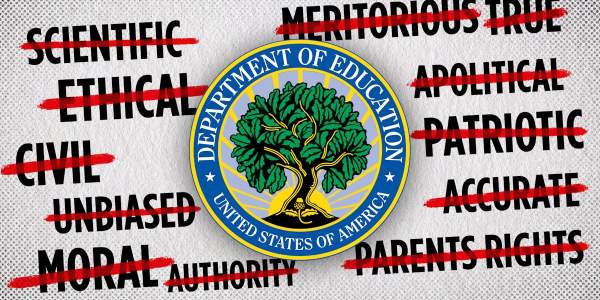“Society's agreement on what defines an educated person, what constitutes essential knowledge and common discourse has collapsed...Today students are offered thousands of courses...but rarely receive any overarching, meaningful statement of educational goals and intellectual purpose within a larger, coherent framework...Lacking a commitment to common educational goals, faculty members have added courses that reflect their own, increasingly specialized interests...as well as a host of cultural issues, poverty, peace, race, ethnicity, gender, sexual performance [which tends] to compartmentalize knowledge...faculties must tackle the issue...in the end it needs local agreement; it depends on local resources...it cannot be exported or imported...Whether we like it or not, teachers are a role model for their students...we should acknowledge our assumptions as well as accept a common responsibility for accuracy and integrity...and deliberately leave the fundamental freedom and responsibility at the individual level." --F.H.T. Rhodes (Pres. Emeritus-Cornell)
“The only way to gain a clear idea of what the objective is, is to first discuss the difficulties that must be resolved.”---Aristotle
The most important thing to re-organize in our education system is our own thinking about it. We cannot continue to project yet another unworkable Utopia. We need to begin by facing up to the debacle so as to understand not only the institutional and attitudinal factors behind the failures of the educational system, but also the factors behind its successes in thwarting repeated attempts at fundamental reform. We need to face the harsh reality of the kind of people we are dealing with, the kind of bitter fight we can expect from them if we try to disturb their turf and perks-and the bleak future of our children if we don't. The perceived self-interest of the educational bureaucracy is the key obstacle to the introduction of market competition in schooling. This interest group has adamantly opposed every attempt to study, explore, or experiment with voucher plans. K. B. Clark (a black educator and psychologist) summed up the attitude of the school bureaucracy: "It does not seem likely that the changes necessary for increased efficiency of our urban public schools will come about because they should...What is most important in understanding the ability of the educational establishment to resist change is the fact that public school systems are protected public monopolies with only minimal competition from private and parochial schools. Few critics of the American urban public schools dare to question the givens of the present organization of public education...Nor dare the critics question the relevance of the criteria and standards for selecting superintendents, principals, and teachers. A monopoly need not genuinely concern itself with these matters. As long as local school systems can be assured of state aid and increasing federal aid without the accountability competition brings, it would be sentimental, wishful thinking to expect any significant increase in the efficiency of our public schools. If there are no alternatives to the present system - short of present private and parochial schools, approaching their limit of expansion - then the possibilities of improvement in public education are limited."
The attitude of the professional educators toward vouchers is well expressed by D. Gee, headmaster and secretary of a local teachers' union: "We see [vouchers] as a barrier between us and the parent. We make our judgment because we believe it's in the best interest...It's the philosophy of the [marketplace] that we object to."
In sum, Gee objects to giving the customer, in this case the parent, anything to say about the kind of schooling his child gets. Instead, he wants the bureaucrats, like himself, to decide.
One community after another is persuaded by the local superintendent of schools or other leading figures in the educational establishment to withdraw from experimenting with vouchers and school choice.
Needless to say, at least some parents view things very differently. Said M. Walton: "As the present system stands, we parents have no freedom of choice whatever. We are told what is good for us...we’re told that the teachers are doing a great job... the teachers say they’ve a gun at their head, but they've got the same gun at the parents' head, for the moment".
CONTINUED...
Supplemental Info:
https://patriotpost.us/article....s/112986?mailing_id=
